Spring 2024
Issue 13, Volume 1

Spring 2024
Issue 13, Volume 1
Itrust this message finds you well. As we embrace the new year, it brings me great pleasure to share with you the highlights and achievements of the Aboriginal Lawyers Forum over the past quarter. The community's engagement and enthusiasm has been remarkable, reflecting the strength and unity of our vibrant legal community.
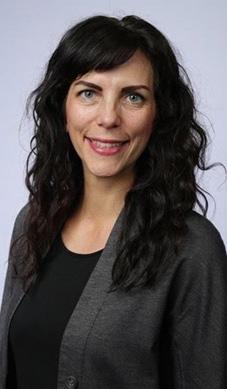
1. ALF Holiday Banquet Success: Our banquet held on November 24 was an incredible success, with record-breaking attendance of nearly 300 esteemed guests. We were honoured to have the distinguished virtual presence of the Honourable Michelle O'Bonsawin, whose keynote address added a profound touch to the evening. Together, we raised funds through the silent auction for the Warrior Project, a cause close to our hearts, supporting the development of law and articling students within our community. Our heartfelt appreciation goes out to all our sponsors, particularly Vela Wealth and MLT Aitkins, whose generous support has played a pivotal role in the success of our endeavors.
2. ALF Awards Recognition: During the event, we recognized outstanding individuals within our community through the presentation of the annual ALF Awards. This year, the Special Contribution Award was bestowed upon the highly deserving Hereditary Chief Bill Wilson, Hemas Kla-Lee-Lee-Kla whose remarkable dedication and achievements have left an indelible mark on our legal landscape.
Furthermore, we were delighted to present the ALF Student Award to UVic student Ashley Roussel, TRU student Bailie Copeland, and UBC student Cheyenne Campbell, celebrating their commitment to excellence and promising contributions to our legal community.
3. Monthly ALF Beading Lunches: Our beading lunches, hosted by me, have become an opportunity for members to connect, share beading techniques, and support one another. These gatherings, held on the third Friday of each month, provide a unique space for Indigenous lawyers to network and build lasting relationships while engaging in the art of beading.
Continued on the following page
Forum Drum Editors
Christina J. Cook, Charlotte Rose, Shawnee Monchalin
Executive Update
Liability of Industrial Plaintiffs for wrongful acts by police in enforcing a civil injunction: the undertaking as to damages
Joint ALF-SAGDA Meeting: A Discussion with the Honourable Harry LaForme
Randy’s Reflection: meaningful reconciliation, through mentee/mentor relations
CBABC BarTalk –Indigenous Matters
Revitalizing Indigenous law with the Lower Fraser Fisheries
Alliance: Legal Traditions of the Peoples of the Lower Fraser Donations for the 18th National Indigenous Peoples Day Online Auction
Historic Appointment of the Honourable Leonard Marchand Jr. as Chief Justice of British Columbia and Yukon
Gathering of Legal Eagles - The Aboriginal Lawyers Forum's 13th Anniversary Holiday Banquet
Indigenous Law Students Association at TRU Law Update
Indigenous Law Students Association at UBC Update
Congratulations to Linda Locke, KC on Her Reappointment to the Independent Advisory Board for Senate
Reconciling Retirement Cases to Watch
Remembering When – Indigenous Law Students of the Past A View from Tsawwassen First Nation Judicial Council
Bencher Update
Continued from the previous page
4. Speed Mentoring: We hosted another success ALF Speed Mentoring Event on March 14, 2024. This event brought together UVIC and UBC students to meet with Indigenous lawyers for a fun and face-paced networking evening A big thank you to our co-hosts and co-organizers Lee Schmidt and Zach Ramano!
5. ALF Retreat: Mark your calendars for our annual retreat in Whistler, taking place on May 24-26 at the Squamish Cultural Centre. This year's theme, "Well-being and Flourishing," promises a weekend of reflection, connection, and rejuvenation in the beautiful territory of the Lil'wat and Squamish Nations.
As we continue to foster a sense of community, support and growth within ALF, I invite each of you to actively participate in our upcoming events and initiatives. Your involvement strengthens the fabric of our organization and contributes to the flourishing of Indigenous legal professionals.
Wishing you all a prosperous and fulfilling quarter ahead.
Industry has made use of the civil injunction to break resistance to its projects on the traditional, unceded territories of the First Nations in British Columbia. The injunctions obtained by Teal Cedar Products Ltd. in the “Fairy Creek” case and by Coastal Gaslink Pipeline Ltd. with respect to the Wet’suwet’en Yintah may be the most familiar examples to most of us. Two of the common elements of these injunctions are:
• the injunctions are enforceable against anyone who has notice of them; and
• the injunction authorizes the RCMP and other police authorities to arrest people the police believe to be contravening the injunction.
The effect is that the Industrial Plaintiff, as I will call it, gains the use of the police as a de facto private security agency to enforce its interests. The police, state agents supposedly tasked with acting for the public benefit, take direction from and act to enforce the interests of the Industrial Plaintiff. The depth of the police-Industrial Plaintiff relationship was detailed by Shiri Pasternak in her recent article, “Why is the RCMP taking civil-liberties advice from pipeline company lawyers?” published by ricochet. 1
The police have violated the rights of land defenders and media in purporting to enforce the injunctions; for example, see the decisions of Justice Thompson in the Teal Cedar Products Ltd. v. Rainforest Flying Squad action at 2021 BCSC 1554 and 2021 BCSC 1903. However, while the unlawful police actions take place in the context of the police acting to protect the private interests of the Industrial Plaintiff, it might seem that the Industrial Plaintiff can escape liability for these unlawful acts.
Vicarious liability for the wrongful conduct of police is with the state. For the RCMP acting as the provincial police force for British Columbia, this liability can flow to both the federal Attorney General and the provincial Solicitor General. The Industrial Plaintiff would seem to escape liability for wrongful acts by the police to enforce the injunction obtained by the Industrial Plaintiff in its own interest. This is unjust.
Continued on the following page
S.
Continued from the previous page
There is a mechanism to address this injustice. It results from the undertaking to the court that must be given by a party in order to be granted the injunction. Rule 10-4(5) of the Supreme Court Civil Rules provides that:
“Unless the court otherwise orders, an order for a pre-trial or interim injunction must contain the applicant's undertaking to abide by any order that the court may make as to damages.”
In my experience with interlocutory inunctions, the undertaking is not always contained in the injunction order. Instead, one may find a form of undertaking proffered by an Industrial Plaintiff on its application to obtain the injunction within an affidavit filed in support of the application. For example, in the CGL case a proffered form of undertaking is found in an affidavit filed by CGL, as follows:
“I am authorized on behalf of Coastal GasLink to depose that Coastal Gaslink will abide by any order concerning damages that this Honourable Court may make if it is found that granting of the injunction order sought causes compensable damages to the defendants.”2
This form of undertaking does not meet the requirements of Rule 10-4(5) in that it attempts to limit the undertaking to damages caused by the granting of the injunction order and to defendants in the action. In my view, an Industrial Plaintiff is (or should be found to be) bound by the form of undertaking set out in Rule 10-4(5) unless the court expressly states otherwise in granting the injunction order. Bearing in mind that the injunction in these cases is enforceable against anyone with notice of the injunction, it is reasonable and just to interpret the scope of the undertaking to include anyone against whom the injunction is enforced by wrongful acts.
The undertaking as to damages should serve as a mechanism to making Industrial Plaintiffs pay damages awarded to persons as the result of the wrongful acts of police in enforcing injunctions obtained by Industrial Plaintiffs. The obligation on the Industrial Plaintiff to pay damages arises from its promise to the court to pay such damages in exchange for being granted the extraordinary relief of an injunction. Where damages are suffered by someone against whom the injunction was wrongfully enforced, the promise is triggered and the Industrial Plaintiff should be made to honour that promise.
Use of the undertaking as to damages in this way will serve justice by ensuring that the Industrial Plaintiffs who use injunctions to advance their interest are held liable for damages suffered by those persons against whom the injunction is enforced by wrongful acts.
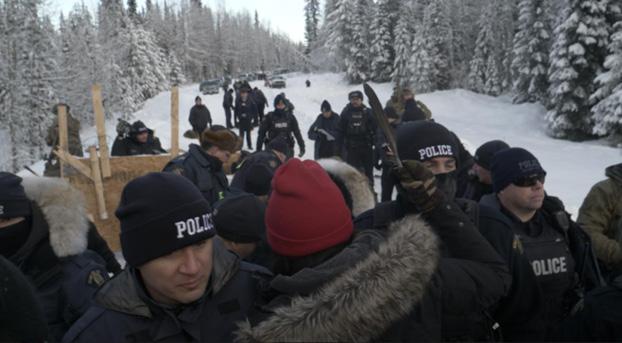
Building off the success of our last joint session with Tuma Young, KC, and Carly Teillet in 2022, on November 30, 2023, the Aboriginal Lawyers Forum and the Sexual and Gender Diversity Alliance held a joint section meeting where we had the privilege of learning from the Honourable Harry LaForme.
Harry is a member of the Eagle Clan of the Mississaugas of the Credit First Nation. He was called to the Ontario Bar in 1979 and appointed to the Ontario Superior Court of Justice in 1994. In 2004 he was appointed to the Ontario Court of Appeal, making him the first Indigenous person to be appointed to an appellate court in Canada. He retired from the bench in 2018 and is currently senior counsel at Olthuis Kleer Townshend LLP in Toronto.

In 2002, the then Justice LaForme wrote the groundbreaking same-sex marriage decision in Halpern v. Canada, finding that the common-law rule defining marriage as being the “lawful and voluntary union of one man and one woman to the exclusion of all others” violated section 15 of the Charter.
His decision was upheld by the Ontario Court of Appeal. In 2019, he was the recipient of the SAGDA Ally Award for his commitment to advancing the cause of equality for lesbian, gay, bisexual, transgender and two-spirited people within the Canadian legal profession.
During our discussion, Harry spoke about intersectionality and 2SLGBTQIA+ communities as well as honouring our history and future within the legal profession. It was an incredibly inspiring and informative discussion. Harry shared insight into his experience hearing and deciding Halpern and how his lived experience as an Indigenous person impacted his decision-making. He discussed why diversity on the bench was so important and the challenges he experienced being the only Indigenous judge at the Ontario Court of Appeal. Harry also shared advice regarding how to advocate for our communities in the current political climate and how to remain strong in the face of these challenges.
After the presentation, Harry shared with me the following:

“Your generation has a big task: to move our common issues forward and keep the ones we’ve already achieved. Good luck. It sounds like you guys are up to the task.”
Missed the meeting? You can watch it online on the “Minutes and Resources” page of the ALF Section page! Do you have topic or speaker suggestions for our next joint ALF-SAGDA session? Share them with Breanne.
Watch the recording >
Apowerful expression of my role in the profession has been to bring my Timiskaming First Nations background perspective as a lawyer. In this role, I frequently engage with the impacts of the justice system on Indigenous Peoples. The cultural context that I live and experience is what I carry with me every day as a lawyer. In essence I carry the culture wherever I go, by virtue of being Indigenous in the justice system, and by holding mentorship toward the advancement of reconciliation within the legal profession. My mentorship as an Indigenous lawyer at the Indigenous Community Legal Clinic forges a way of enacting and bringing meaning to the pivotal documents of the United Nations Declaration on the Rights of Indigenous Peoples and Truth and Reconciliation Commission’s Calls to Action
The ICLC is located in the Downtown Eastside on Coast Salish territories and exists to provide free legal services to the Indigenous community and, to provide experiential legal education to Allard Law students. Under supervision six select student clinicians interact with clients and attend court as temporary articled students. At the forefront of my mentorship is to highlight the importance of networking by embracing opportunities to meet with judges, crown and defence counsel.
Within my mentorship, I am able to share my experiences with projects and trends taking place in Indigenous justice circles. The mentor/mentee opportunities that I present provide, in part, access to three pinnacle areas that map the clinician’s immerging professional landscape. First, developments pertaining to the enhanced cultural competency within the law society by way of regulatory reform; a fast-developing shift toward a single regulator and the implementation of the BC First Nations Justice Council.
A significant regulatory decision in 2021 called the Bronstein decision highlighted the vulnerability of Indigenous peoples in the Law Society’s complaints process. In 2022, I shared important insights with the Law Society’s Regulatory Task Force about the possible challenges that Indigenous clients may face when seeking a resolve within its regulatory framework. Karen L. Snowshoe, Panel Chair in Bronstein rendered a powerful dissent emphasizing the importance of advancing Indigenous cultural awareness in the profession. My presence consulting the Task Force was critically informed by my experiences at the ICLC working with Indigenous clients in the Downtown Eastside. The value of sharing with the current clinicians my experiences consulting on the Task Force is they may envision an application of their experiential learning at the ICLC. Clinicians became aware of how their experiences with Indigenous clients might be included for the rethinking of how cultural competency informs the regulatory process of lawyers and protection of the public.
As a profession we are facing a proposed transition to a single regulator. This development entails a pronounced shift in how lawyers are regulated, and by whom. The shift sparks a need for future lawyers to be aware of the implications. I have included in my presentations to the clinicians about how they might start thinking about this shift. In particular, how their involvement in shaping the future of regulation can be achieved by sharing their experiences. It is critically important to incorporate, Indigenous perspectives to the regulation of a growing professional body, the clinicians’ experiences are valuable to the profession as we grapple with the changes.
Lastly, the enhancements through the BCFNJC to increase access to justice for First Nations encountering the criminal justice system affords legal professionals a powerful new horizon and relationship with the justice system. This is a recently implemented enhancement strategy that has increased funding and affirmed a long-held position that Indigenous Peoples have about selfdetermined justice involvement. An example of self-determined control over justice services is evidenced through the ongoing transition of legal aid services to BCFNJC, control over Gladue services, and the justice reconciliation in core locations. The importance of sharing about self -determined justice with the clinicians is that upon their entry into the legal profession, they will inevitably find themselves within a historical happening that not only reflects their experiential learning at the ICLC but how their participation in the justice system is vital to the path for reconciliation.
In summary, I view the mentor/mentee relationship as both a contributive and valuable source of communication that enables the clinician mentees to gain meaningful insights from a select team of legal professionals and in turn attends to the primary goals mentioned earlier toward responding to the calls for action. Furthermore, the ICLC serves as a firm attribute for a fulsome, successful legal education that encompasses Indigenous calls to action goals.
In a recent issue of the CBABC BarTalk magazine Myrna McCallum wrote for the Indigenous Matters column that "Trauma-Informed Lawyering Will Transform Your Practice".
BarTalk magazine discusses legal news and issues from across B.C. It is published six times per year. The Indigenous Matters column is a regular feature in BarTalk. It provides an Indigenous perspective on legal news and issues that are particularly relevant to Indigenous people.
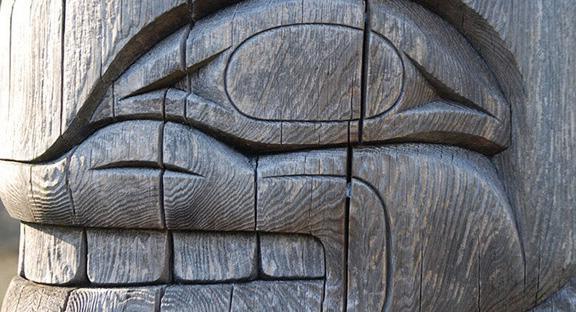
If you are interested in contributing an article to Indigenous Matters, contact me at isabel.jackson@justice.gc.ca. Below are upcoming BarTalk issues and we are looking for Indigenous Matters authors. The Indigenous Matters column is not necessarily limited by the BarTalk theme. If there is a particular topic you would like to write about, please let us know.
August 2024 - Public Law/Politics and Law
October 2024 - Diversity in the Legal Profession
December 2024 - Charities, Not-for-Profit Law and Pro Bono
February 2025 - Lawyers as Caregivers
April 2025 - Artificial Intelligence
Cree lawyer Leah Ballantyne and West Coast Environmental Law have undertaken an important project for the revitalization of Indigenous laws in B.C. Leah acts as LFFA- RELAW Coordinator on the Revitalizing Indigenous law with the Lower Fraser Fisheries Alliance: Legal Traditions of the Peoples of the Lower Fraser. This project codifies a two-year process of learning what stories, both sxwōxwiyám / sx̌ʷəx̌ʷəyém ‘oral histories describing the distant past / tell stories’ and sqwélqwel / sqʷelqʷəl ‘true stories/ true news/ family history/ oral stories’, as well as Elder’s knowledge teachings about Indigenous laws related to watershed management and fisheries governance in the Lower Fraser. The result of this effort is the publication of a Summary Report and the accompanying 7 Volume full Legal Synthesis Report was drafted in 2020-21.
It is the intention of the authors that the legal principles in this Summary and the full Legal Synthesis Report are to inform processes for developing an Indigenous-led Fish Habitat Restoration Plan and Climate Adaptation Strategy for the Lower Fraser. The Strategy will be led by Lower Fraser Fisheries Alliance and its member nations, in collaboration with interested stakeholders and allies.
Find out more about the Revitalizing Indigenous law with the Lower Fraser Fisheries Alliance: Legal Traditions of the Peoples of the Lower Fraser project and read the reports.

This unique fundraising event brings the B.C. legal community together and has had great success over the years. To date, the auction has raised approximately $150,000 to support Indigenous law and articling students.
Owing to the success of our annual auction, we launched the Warrior Project in 2022. The ALF is proud to continue our strong support of Indigenous law and articling students – our future Legal Warriors – through the launch of this very special initiative.
The auction runs each year during the week of June 21 – National Indigenous Peoples Day. If you would like to support our online auction, please contact isabel.jackson@justice.gc.ca. Suggested donations are indicated below.
Are you an artisan or crafter? Many auction items are original works, Indigenous and non-Indigenous -- books, photography, paintings, limited edition prints and jewellery. These original works contribute to both the success and distinctiveness of our auction. Please consider donating your original work to this year's event. It will be a great opportunity to profile your talent while supporting a worthy cause.
Not an artisan or crafter? Consider donating any item that will attract a bid including select pre-owned items that remain suitable for recycling/re-gifting. Be creative when considering what you can donate to be auctioned off.
Tickets, passes, gift cards/certificates, etc. are other popular items. Consider soliciting a donation from your favourite restaurant, spa or other business that you patronize. Promotional opportunities are provided on the auction website.
Mentor Lunches. Experienced lawyers will take their winning bidder out for lunch for a time of sustenance in the form of food for the body as well as the mind and hopefully for the soul too! This is a unique opportunity for both mentors and protégés. Consider auctioning yourself off as a mentor or encouraging someone else to do so.
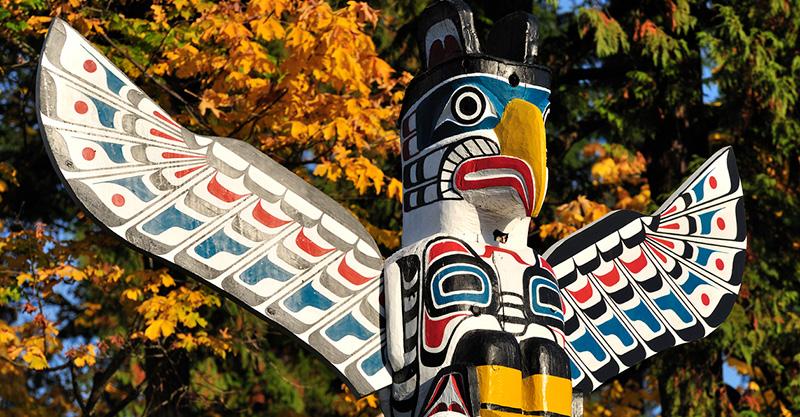



On December 8, 2023, Prime Minister Trudeau announced the appointment of Honourable Leonard Marchand Jr. as the new Chief Justice of the British Columbia Court of Appeal and the Yukon Court of Appeal. Chief Justice Marchand is the first Indigenous person to hold these positions.
Chief Justice Marchand is Sylix and a member of the Okanagan Indian Band. He grew up in Kamloops and graduated from the University of Victoria Faculty of Law in 1994. He has served as a judge on all three levels of court in British Columbia: the Provincial Court from 2013 to 2017, the Supreme Court from 2017 to 2021, and became the first Indigenous judge on the Court of Appeal in 2021.
Chief Justice Marchand has dedicated a substantial portion of his career to advancing reconciliation. He has been a long-time supporter of the Aboriginal Lawyers Forum and is a role model to all Indigenous persons in the legal profession.
ALF Co-Chairs Michelle Casavant and Christina Cook sent a letter to Chief Justice Marchand on behalf of the Aboriginal Lawyers Forum to congratulate him on his appointment:
Dear Justice Marchand,

Len, the entire Aboriginal Lawyers Forum raise our hands to you! Your appointment as Chief Justice of British Columbia and the Chief Justice of the Court of Appeal of Yukon is so historic and so well deserved. Your dedication to the community and service at all three levels of Court in British Columbia is inspiring. Thank you for your efforts to continuing to make our community and entire Province more equitable, fair and just.
The Aboriginal Lawyers Forum is so honoured to call you a friend and supporter. We have been inspired by your presentations and keynote addresses to us at numerous events. All our members are celebrating your appointment, and we know every Indigenous person in British Columbia is walking taller today and beaming with pride at your accomplishments.
Congratulations and thank you for all your efforts to work to break trail for all the Indigenous law students, lawyers and judges that will come after you. All Indigenous law students, lawyers, and judges stand on your shoulders and we are grateful to you.
This is the best Holiday gift we could ask for, all the best to you and your family.
ALF members can congratulate Chief Justice Marchand in person when he gives the keynote address at the ALF Retreat in Whistler on May 25, 2024!
As a networking and mentoring forum for legal eagles (law students, law graduates and lawyers), the ALF Holiday Banquet has seen significant growth each year and this past holiday banquet was no exception, where a total of 216 guests gathered within Coast Salish Ancestral lands to connect, recognize and honour those who continue to break trail for Indigenous people. As part of this, the featured keynote speaker was Supreme Court of Canada Justice Michelle O’Bonsawin. Justice O’Bonsawin is the first Indigenous jurist on the Supreme Court and is an Abenaki member of the Odanak First Nation. Attendees were privileged and honoured to hear Justice O’Bonsawin’s uplifting speech sharing her lived Indigenous experience and journey to the Supreme Court of Canada.
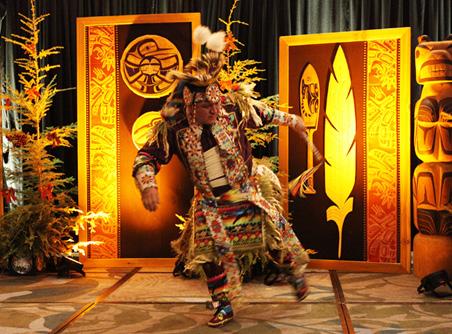
Sharing in honourable contributions to Indigenous people in the legal profession, the ALF recognized Hemas Kla-Lee-Lee-Kla (Bill Wilson) of the Kwagiulth (Kwakwaka’wakw) Nation with the Special Contribution Award. Hemas Kla-LeeLee-Kla has been an advocate for Indigenous rights since law school. He was the second Indigenous person to graduate from law school in British Columbia from UBC’s Allard School of Law in 1973.
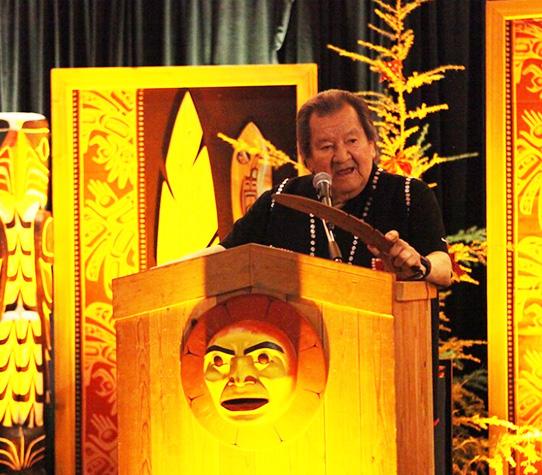
Hemas Kla-Lee-Lee-Kla is a highly influential figure with decades of service in Canadian law and politics. He is known for his trailblazing achievements in organizational and institutional change, advancing the visibility and unity of Indigenous peoples. One of his most notable accomplishments was the successful negotiation of an amendment to Canada’s Constitution in Section 35 of the Constitution Act 1982, enshrining Indigenous title to traditional lands and treaty rights as well as equality of Indigenous women.
Hemas Kla-Lee-Lee-Kla is the father of Jody Wilson-Raybould, the first Indigenous Attorney General and Minister of Justice, and Kory Wilson, the Chair of the BC First Nations Justice Council.
“This award allows us to shine light on someone who has dedicated their career and often their life to advancing Indigenous rights. Hemas Kla-Lee-Lee-Kla embodies that purpose. His work has been foundational to where we are today and his legacy continues,” shared Michelle Casavant, Co-Chair of ALF.
Alongside the ALF Special Contribution Award to Hemas Kla-Lee-LeeKla, three exceptional university students were given the ALF Student Appreciation Awards. The ALF Student Appreciation Awards are given to Indigenous law students who have shown consistent dedication to Indigenous people in the field of law. This year’s recipients were Cheyenne Campbell (Fort Nelson First Nation) of UBC Allard Law, Bailie Copeland
River Métis) of TRU Law and Ashley Roussel (Sweetgrass
UVic
During this momentous night, the ALF was also pleased to support Indigenous children in need especially at this time of year. Many banquet attendees brought wrapped toys in response to our toy drive in support of the Vancouver Child and Family Services Society. Banquet attendees also enjoyed the silent auction and proceeds went to the Warrior Project which helps fund articling positions for Indigenous students in B.C.
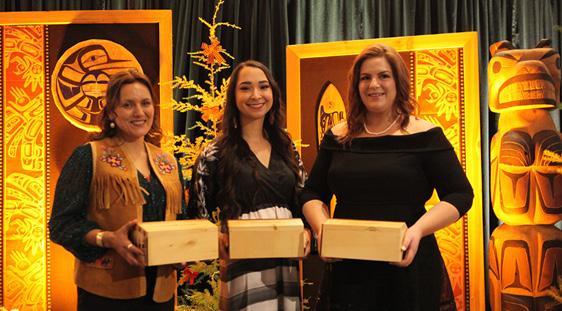
TRU-ILSA is a student-led club located on the unceded, traditional lands of the Tk’emlúps te Secwe̓pemc of the Secwépemculuuw.
The executive committee includes:
First Nation President – Tara-Lynn Wilson
Métis President – Bailie Copeland
Inuit President – Vacant
3L Representative – Rob Houle
2L Representative – Nishjot Sidhu
1L Representative S.90 – Trevor Tailfeathers
1L Representative S.91 – Garfield Staats
Ally Representative – Reanna Thorne
Visual Arts Representative – Shoshana Wilson
Finance Manager – Rosina Hamoni
Social Media Manager – Jessica Murphy
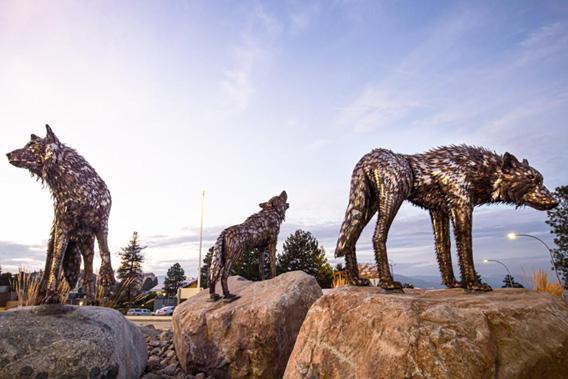
TRU-ILSA restructured their executive committee to have better, and more directed representation of Indigenous law students. The positions of the “First Nation President”, “Métis President”, and “Inuit President” were created so each group of Indigenous peoples are properly represented, and each of their cultures and traditions are respected at TRU law. TRU-ILSA hopes this form of inclusion will encourage all future Indigenous students to consider TRU law as a viable option. The position of Inuit President is currently vacant, and TRU-ILSA hopes to gain more Inuit law students who can fill the position and represent their culture at TRU law. TRU-ILSA created a position within their executive committee this year that will open the club to more diverse members. The “ILSA Ally Representative” position was created to show how ILSA is open and accepting of all law students who find Indigenous legal issues important. They also included a “Visual Arts Representative” position which is intended to not only create a link between TRU law and the rest of the school, but also to have an Indigenous student artist who can provide hand made gifts for guest speakers invited by ILSA. Although TRU has regrettably decided to discontinue the Fine Arts department, ILSA will attempt to keep this position open in the future.
TRU-ILSA's executive committee strives to create a welcoming environment for all TRU Law students. ILSA promotes and encourages learning about Indigenous culture and its interactions with the law. Through collaboration with groups and clubs, TRU-ILSA hosts various events every year to promote Aboriginal culture, awareness, and legal education. They hosted the screening of the documentary film, Kanehsatake: 270 Years of Resistance by Alanis Obomsawin, they co-hosted a senior lawyer to talk about their work with Indigenous international trade, and hosted a one-day conference focused on the careers of two individuals and their work with Aboriginal law in the justice system on March 15. Throughout these and future events, TRU-ILSA aims to increase awareness of the atrocities that Indigenous people faced in the past and to show that Indigenous people still face issues with the legal system.
TRU-ILSA also collaborates with Cplul’kwe’ten (the “Gathering Place”), the Indigenous student centre on campus, by providing a peer mentor to be available weekly and assist in any activities. TRU-ILSA also offers members to speak to Indigenous high school students on, and off-campus who aspire to attend law school someday. TRU-ILSA provides tutoring to Indigenous students who are preparing to write the LSAT exam. All members are firmly committed to repaying and giving back the support their members have received.
Continued from the previous page
It is TRU Law's mandate to implement the Truth and Reconciliation Commission's Call to Action #28 in teaching law students about Aboriginal people and the law. There are numerous elective courses that focus on Indigenous issues and the law, as well as an Indigenous specific moot. The course "Truth and Rebuilding Canadian Indigenous Legal Relations" has been resolutely implemented into the law school curriculum this year. This course focuses primarily on the elements of the TRC Call to Action #28 specific to law schools, including Indigenous Laws, Crown-Aboriginal relations, Treaties, and Aboriginal Rights. Furthermore, the course explores the history and legacy of residential schools, as well as the colonial foundations of law. Indigenous Laws are taught through land-based learning as an integral part of the course. Students will have a profound learning experience by visiting the former Kamloops Indian Residential School, as well as visiting Wells Grey Provincial Park.
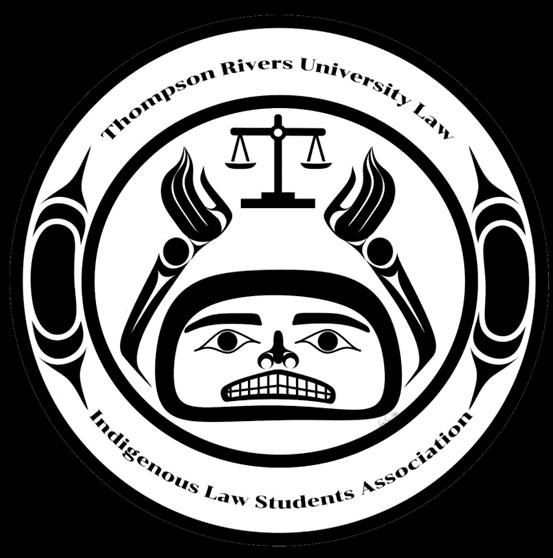
This year TRU hosted the national Indigenous moot known as the Kawaskimhon Moot. The Kawaskimhon Moot encourages students to tackle a topic through an Indigenous perspective, getting their hands deep into a real-world issue of national importance. For example, last year’s moot was held at the University of Victoria, where teams focused on the Coastal GasLink pipeline. Both Tara-Lynn Wilson and Bailie Copeland were one of two teams chosen to participate in this moot. Professor Murray Sholty, organizer of the 2024 Kawaskimhon National Aboriginal Moot stated “TRU Law is delighted to host the 2024 Kawaskimhon National Aboriginal Moot on the traditional territory of the Tkemlúps te Secwépemc on March 8 & 9. The moot will have guests from all over Canada, with participants from twenty Canadian law schools. The event’s keynote speaker will be Chief Justice Leonard Marchand. This gathering is important for TRU Law because it is the first national moot event ever held at the university. There will be experts in Indigenous and Aboriginal law attending. During the event students, coaches, and guests will be able to experience the traditional territory of the Tkemlúps te Secwépemc and visit Thompson Rivers University’s world class campus.”
More information >
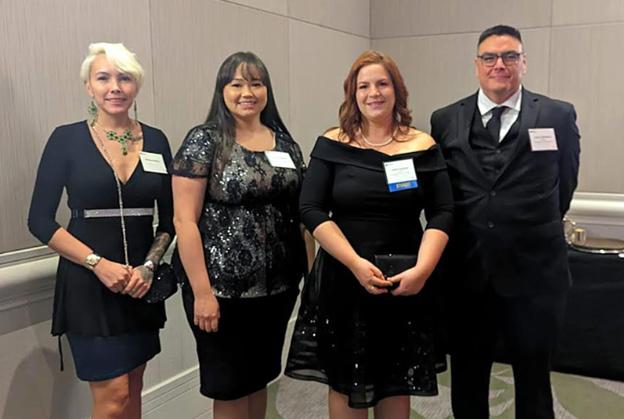
ISLA held the annual Indigenous Awareness Week at UBC from February 5 - 9. This year’s events commenced with keynote speaker, Stephen Mussell, recipient of the 2024 UBC Alumni Builder Award. Additional events included Cedar Weaving with Leonard Williams, an Indigenous Legal Studies Faculty Panel featuring Robert Clifford, Johnny Mack, and Andrea Hilland, an Ethnobotany Tour with T’uy’t’anant Cease Wyss, and a discussion on Indigenous food sovereignty and sustainability with Eduardo Jovel from the Centre for Indigenous Land-Based Education, Research and Wellness at xʷc̓ic̓əsəm.
“The staff and faculty at Allard, especially Lee Schmidt, the Associate Director of Indigenous Legal Studies, were very supportive and helpful. We were able to put together a comprehensive week-long event of law and non-law related topics. All events and food were free and open for all to attend. Student turnout for the various events was quite low, as a few other events were going on at the same time, which likely impacted the turnout. Guests and speakers were super willing to participate when invited. It is great that there were so many people we could have asked to come out and be a guest. There are so many amazing Indigenous legal advocates and non-law related initiatives in Vancouver and UBC. Overall, I am grateful for the opportunity to plan Indigenous Awareness Week events and would like to thank everyone for their support and coming out,” says Brianna Patrick, Indigenous Awareness Week event organizer.
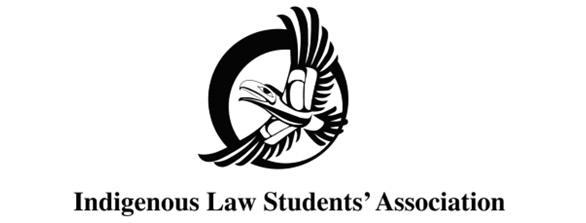
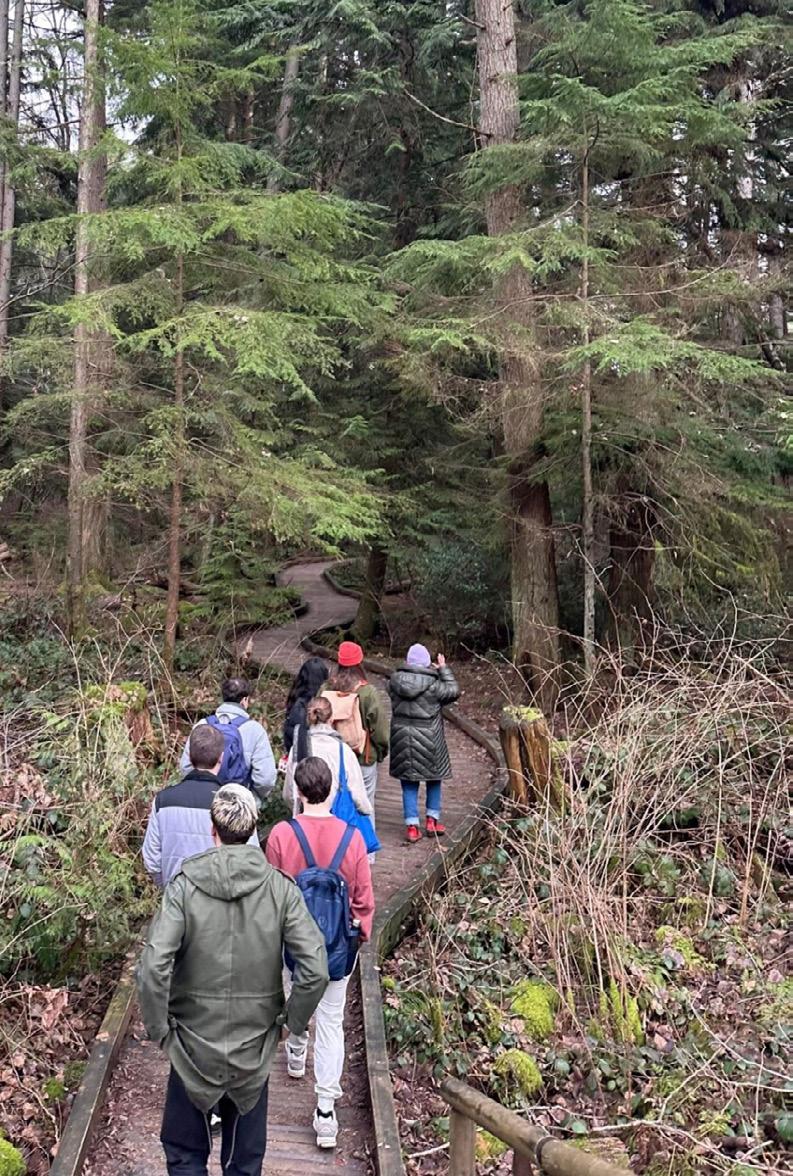
The ILSA Annual Charity Gala was organized by the ILSA Gala Committee, consisting of Co-Presidents Abby Smith and Charlotte Weston, Reilly Dune, Sara Finnegan, Brooklyn Fowler, Sammy Olsen, and Victoria Von Sacken Nash. The Gala is an annual fundraising event to support the Indigenous law students’ bursary and to foster community between Indigenous law students and legal professionals.
As of February, we have raised $41,000 towards our goal of $50,000 in support of Indigenous students. We are hopeful that contributions will continue to be made online. Charlotte Weston comments, “it is difficult to measure the impact that a bursary can have on a student’s life. Indigenous students face significant barriers in attending and succeeding in law school, and bursaries like this one help ensure that Indigenous students get the support they need.”
The Gala was held at the Bill Reid Art Gallery in a reception format, to facilitate networking amongst students and legal professionals. Regarding Gala planning Abby Smith noted, “we wanted to prioritize raising money to endow the bursary fund. We also took into account past Galas, feedback from previous years, and found that a sit-down dinner style was just not who we were — we wanted to go back to our roots and have a reception style gala so it would be easier to connect with one another and foster a greater sense of community. We also wanted to choose a location that aligned with our ideals, so choosing the Bill Reid Gallery was a no-brainer.”
The 2024 recipients of the “Courage in Law Awards” included Christina J. Cook, Judge Raymond Phillips, and Karenna Williams, in recognition of their distinguished professional or academic accomplishments, courageous leadership and outstanding service.
“I think the event was a success, and we received excellent feedback from attendees. The outcome in terms of bursary money was greater than we anticipated, and we are overjoyed with how close we are to reaching our goal,” commented Abby Smith. ILSA would like to extend its gratitude to the community for supporting Indigenous law students and contributing to our goals. We look forward to seeing you next year.
Continued from the previous page
The next steps for ILSA in concluding the year is creating spaces and permanency for Indigenous students at Allard. Whether that is through the endowment of the ILSA bursary fund or the process of creating permanent ILSA seats on committees. These are just some of the initiatives ILSA has been working on throughout the year. Moreover, we hope to create a smooth transition for the next executive team. Our main goal this year was to endow the bursary, and we are so close, so it would be great if the community could help contribute to this goal by donating.
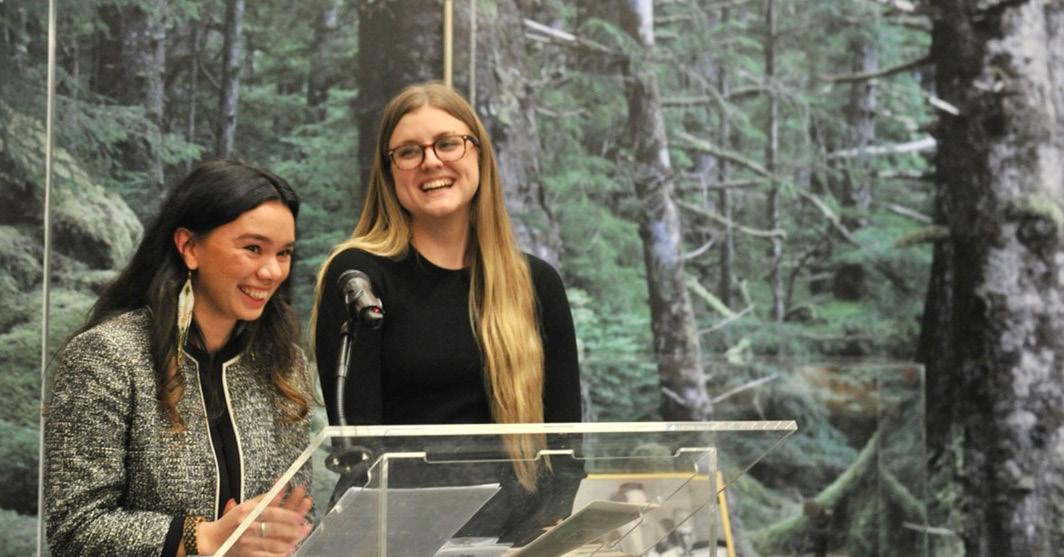
On January 23, 2024, the Honourable Dominic LeBlanc, Minister of Public Safety, Democratic Institutions, and Intergovernmental Affairs, announced appointments to the Independent Advisory Board for Senate Appointments, which included the reappointment of First Nations Lawyer Linda Locke, KC.
The Independent Advisory Board for Senate Appointments board is an independent and non-partisan body mandated to provide the Prime Minister with merit-based, nonbinding recommendations on Senate appointments.
Linda Locke, KC. was one of two appointments for B.C. Linda has dedicated her career to helping Indigenous people and other disadvantaged residents navigate their way through the Canadian legal system. She is the manager of the Hazelton-based Upper Skeena Counselling and Legal Assistance Society, which assists individuals across northern British Columbia with everything from poverty and family law to community development initiatives and access to justice issues. As manager of the USCLAS, she played a key role in the development and opening of the Hazelton Indigenous Court in 2022.
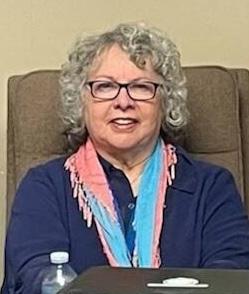
She was the first Indigenous woman in B.C. appointed as Queen’s Counsel, an honour she received in 2006. A member of the Stó:lō Nation from the Fraser Valley, Ms. Locke began her career as a social worker and, later, a probation officer. But it was her work as an Elizabeth Fry Society court worker that inspired her to consider a career in law. She attended law school at Queen’s University and was the recipient of the university’s Alumni Achievement Award in 2009. She was also the recipient of CBABC’s Community Supporter Award in 2003.
Congratulations Linda and well done!
Shouldretirement be a consideration for those who are committed to Indigenous Peoples, the advancement of their rights, to social justice, to economic reconciliation and to nation-building? Is the work ever done? Is it right for someone at 61 years old to retire from a 35-year career of full-time practise of Indigenous Law when the work is a calling as opposed to a profession? These were tough questions for me and questions many young Indigenous lawyers may ask themselves one day. Since leaving Clark Wilson as a partner and head of their Indigenous Practise Group, I have had to grapple with these questions. Ultimately, these questions are entirely personal and individual; there are no identical or right answers.
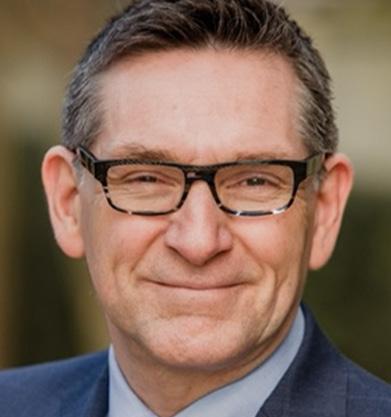
For me, the answers to these retirement questions came from having done enough important work, showing others the way forward, creating a path for them, as well as the desire to use my time and resources for the many things I have said no to all these years. I have said no to learning my own language, to spending more time on the land, to spending more time with family, to being there for aging parents, and to staying active and expressing myself artistically. As well, I remain committed to the advancement of Indigenous economies and Indigenous wealth creation as well as reconciliation. My board work provides those opportunities as does the focussed legal work which I retain. So those are my reasons. In my view, it is a healthy thing to wonder what yours will be long before the time comes. We get so wrapped up in our work that our careers become our identity and we lose the plot and have a tough time retiring or we simply become fearful of the abyss beyond the work.
So that is my reason for getting out of the full-time grind. What about getting in? Everyone has their own reasons for becoming a lawyer and for diving into Indigenous Law in one area of the profession or another. I was no different. For me it combined my core values, sense of social justice, Indigenous identity, the love of complex puzzles, and the challenge of near to impossible tasks in the economic sphere. I loved acting for the underdog Indigenous nations taking on the big Industry players like DeBeers, Shell, Imperial Oil, Kinder Morgan, Enbridge, Teck, Canfor, and numerous crown corporations. I loved working hand in hand with Indigenous leadership and other advisors to bring sometimes complex issues filled with business, cultural, regulatory, and legal concepts to membership meetings in understandable and meaningful ways. This always resulted in some amazing sources of wisdom and insight from community members that inspired my work immensely. There are simply too many stories and not enough time!
Having had no real mentor, I developed a love and commitment for mentorship and the opportunities to teach, to educate and to encourage young professionals with similar passions, especially Indigenous professionals. Many have become friends and I have been inspired by their brilliance and many accomplishments. These former students, juniors and friends have gone on to start their own firms, become judges, professors, entrepreneurs, work in senior cabinet roles, win big cases, and be appointed for numerous awards. It’s downright fun to see and experience their amazing successes.
Yet there have also been profound sadness and loss. Last fall, Leanne and I had the pleasure of travelling to New Zealand, or Aotearoa in Māori. After some 37 years, I was reunited with an old friend and Māori law school mate Joe Williams, now Sir Justice Joseph Williams of the Supreme Court of New Zealand, that country’s top court. While it was such a sweet visit, we did spend the first hour or more speaking of all our former friends and classmates who have left the profession, endured serious personal or health difficulties, passed on, or some combination thereof. I suppose its to be expected to some degree after all the years, but this seems much more pronounced within the Indigenous community. I have endured so many personal and family challenges throughout as the commitment to Indigenous Peoples and the corresponding effort takes its toll. I have lost loved ones, lost deep friendships, said no to so many competing interests or passions and endured criticism from so many, even loved ones. I have also endured loneliness at times where the work takes place on the boundary of the Indigenous and non-Indigenous worlds with little understanding of “the other”. Thankfully, that is changing. Continued on the following page
Continued from the previous page
Yet I would do it all again in a heartbeat. It is because I have truly been blessed, inspired, and encouraged by so many amazing people along the way. Hope and vision get us started but friends provide the fuel along the way. I love the Indigenous Bar Association conferences for that; just hanging out with other older ‘comrades’ who have been through it is simple and profound medicine.
So, what is it like to actually retire? I can say without a doubt that it’s been amazing and a strange combination of quiet and confusing chaos. I have gone from that senior counsel with a strong command of my work and seen as an expert to being a complete neophyte retiree. I was that wide-eyed articling student again! I simply had fun with the transition from being a socalled lawyer with a name to just an old guy on a bike who knew little about retirement. The bike club in Penticton have the fittest old farts you’ll ever meet, and they have little interest in my career and that’s refreshing. They have been welcoming and encouraging as I figure out this new phase.
I was that typical type A driven lawyer retiree that put way too many things on his bucket list in the first year of retirement. We travelled to Mexico, I chaired a CLE, we sold our Vancouver home, moved full time to the Okanagan, I rode my bike through the Pyrenees and ate my way through San Sebastien, Spain, I cycled a ton, we married off one of our children, and we travelled to Fiji, New Zealand, and Australia, which included me sailing with a pal sailor from Fiji to New Zealand. Way too much. That was dumb!
We now have more time for friends and family, and in a way we have been reconnecting. Living in the beautiful Okanagan is a wonderful draw to have folks come and visit. The lake, the sunshine and the wine are likely more the draw than Leanne and me! Let’s face it, the work requires so many sacrifices, but I refused to make those forever.
Here's a few questions I’ve asked myself: What’s the point of fighting for Aboriginal and treaty rights if you don’t get out on the land and not only exercise but thoroughly enjoy your own rights with family? What’s the point of fighting for the Indigenous control and development of our families, our child welfare and our languages, if we don’t spend time loving our own families and learning our own languages? What’s the point of praising and protecting our elders if we don’t work towards one day becoming one ourselves? Hopefully these questions will guide my next phase of life as we all together continue on with ‘the struggle’.
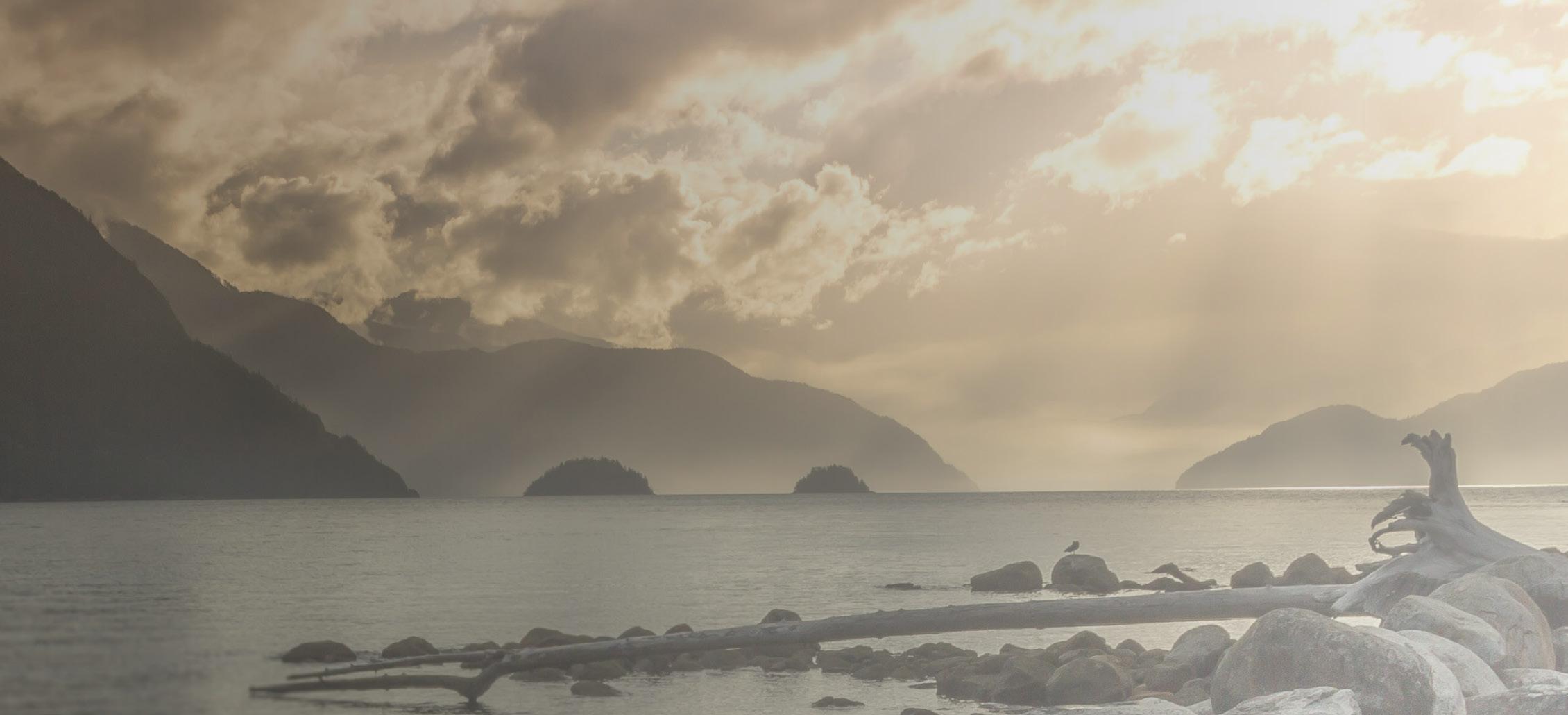

The Gitxaała Nation commenced a partial appeal of the BC Supreme Court decision in Gitxaała v. British Columbia (Chief Gold Commissioner), 2023 BCSC 1680. The Court held in that decision, that neither DRIPA nor UNDRIP create substantive obligations in domestic law that relate to the province’s duty to consult, noting that “a correct, purposive interpretation of DRIPA does not lead to the conclusion that DRIPA ‘implemented’ UNDRIP into domestic law. Instead, DRIPA contemplates a process wherein the province, ‘in consultation and cooperation with the Indigenous peoples in British Columbia’ will prepare, and then carry out, an action plan to address the objectives of UNDRIP” (at para 466).
Gitxaała appeals (1) the Court’s refusal to quash the specific mineral claims challenged by Gitxaała; (2) the Court’s refusal to prevent further automatic claim-staking in Gitxaała territories; and (3) the Court’s decision that the Declaration on the Rights of Indigenous Peoples Act (DRIPA) is not legally enforceable.
In November 2022, the BC Human Rights Tribunal ruled that VACFSS discriminated against R.R., an Afro-Indigenous mother, while her children were in VACFSS’s care. VACFSS sought review of the Tribunal’s decision, arguing that the Tribunal did not have jurisdiction to consider discriminatory practices under the Child, Family and Community Service Act, and the Tribunal’s process was procedurally unfair.
The BCSC recognized the Tribunal’s jurisdiction over discrimination complaints alleged against child welfare agencies but found several errors in relation to the Tribunal’s procedure and consideration of historical and social context between Indigenous peoples and the child welfare system.
R.R. has commenced an appeal of the decision.
The Court in R. c. Montour, 2023 QCCS 4154 found it was appropriate to develop a new test to determine whether an activity constituted an Aboriginal right within the meaning of section 35 (para 1320). It said that there had been significant changes in the legal and political landscape since the test established by the Supreme Court of Canada in the 1996 Van der Peet decision. The Court held that the determination of an Aboriginal right should be based on whether the activity in question was protected by the traditional legal systems of the Indigenous peoples who claimed the right (para 1296).
The province has commenced an appeal of the decision.
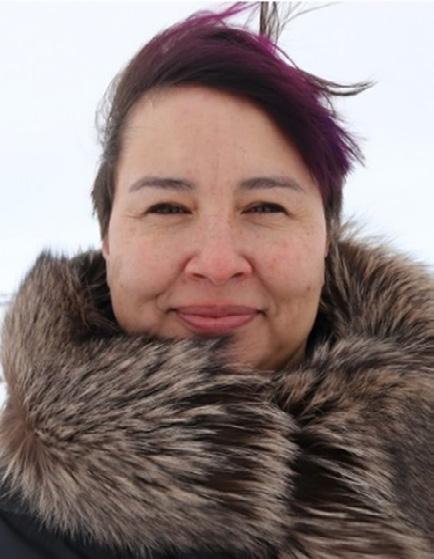
Sandra Inutiq is the first Inuk woman called to the Bar in Nunavut in 2006. Sandra received her law degree from Akitsiraq Law School in 2005, and in 2006, she became the first Inuk woman in Nunavut to pass the bar exam. Sandra is currently a sole practitioner and previously served as the Director of self-government at Nunavut Tunngavik Inc. Chief Negotiator for the Qikiqtani Inuit Association for the Tallurutiup Imanga National Marine Conservation Area’s Inuit Impact and Benefit Agreement.
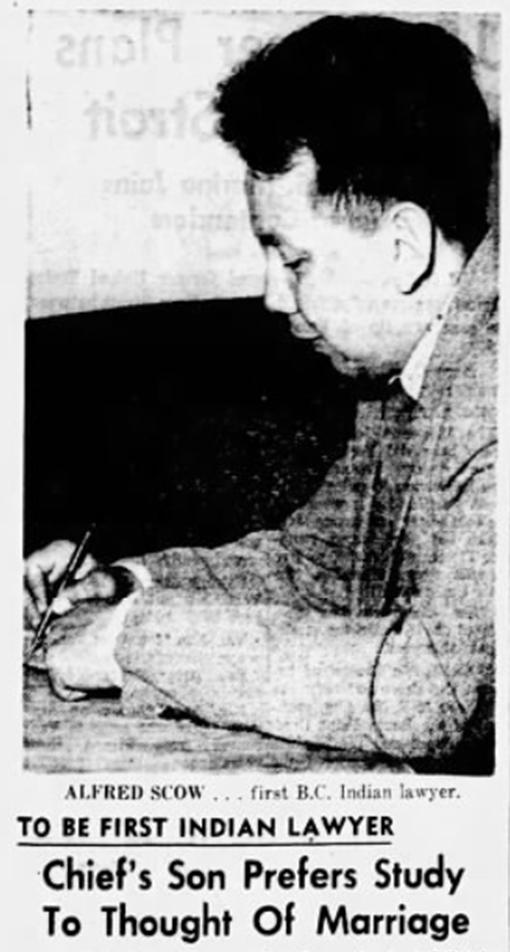
Harry Laforme, in 1978 as a second-year student at Osgood Hall. Justice Laforme was appointed to the Ontario Court of Appeal in 2004 and previously appointed to the Ontario Superior Court (1994). He is a member of New Credit First Nation.
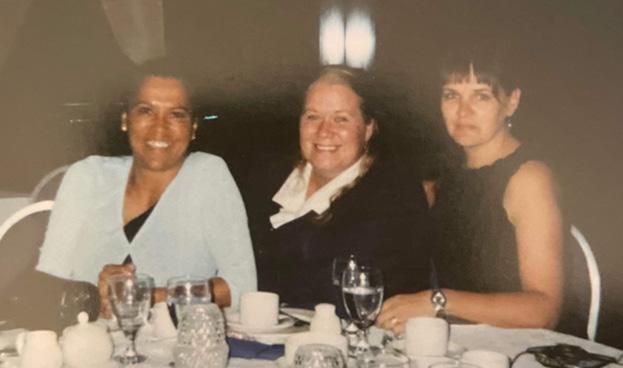
Alfred Scow in 1958. Judge Scow was appointed to the BC Provincial Court in 1971 –becoming the FIRST Indigenous person in Canada to be appointed to the Bench. Judge Scow was a member of Kwicksutaineukah-kwa-mish First Nation.
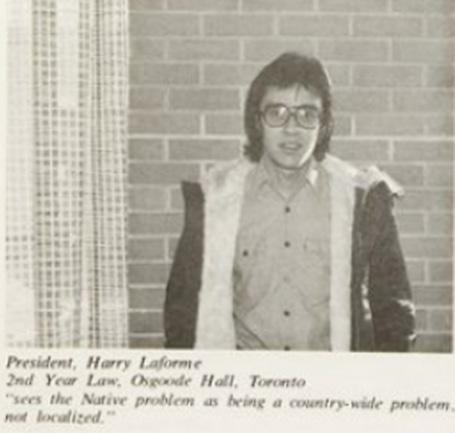

Tsawwassen First Nation restored their right to self-government in 2009, upon ratification of their Treaty with the federal and provincial governments, and with it reclaimed its self-governing constitutional authority to make laws. The “Declaration of Tsawwassen Identity & Nationhood” proclaimed its vision for its legal system as follows:
Today, The Tsawwassen Government will enact a suite of contemporary laws that are fundamentally based on traditional laws and principles that have been carried through each generation.
By enacting Tsawwassen Laws, we reaffirm these traditional principles and transmit them to subsequent generations in a manner that has relevance in modern society.
The Tsawwassen Constitution Act and Administrative Review and Judicial Proceedings Act created the Judicial Council as a branch of its government responsible for resolving disputes that arise on Tsawwassen Lands, resolving disputes between Tsawwassen Members and Elected Officials, hearing appeals from administrative decisions and adjudicating challenges to the validity of Tsawwassen Laws. It is composed of five members appointed by the Executive Council and must be composed of:
1. At least one Member of the Tsawwassen First Nation;
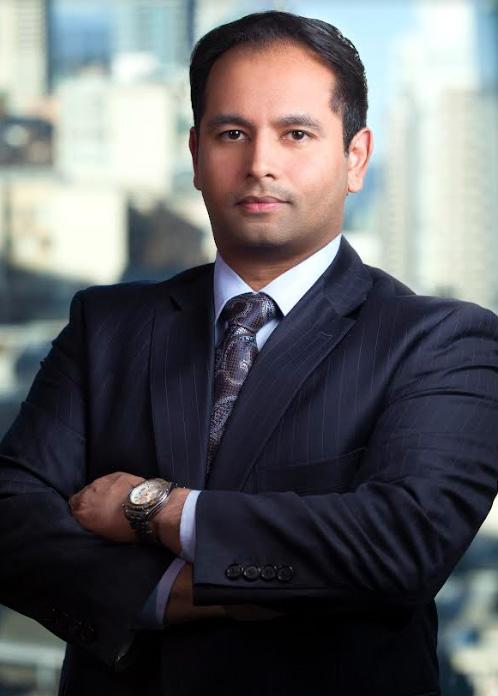
2. Two appointees who are not Members of the Tsawwassen First Nation or have a direct interest in the Tsawwassen First Nation;
3. two appointees with some legal background, and who may or may not be Tsawwassen Members; and
4. At least two appointees are to have a degree of familiarity with Tsawwassen First Nation traditions and culture.
In 2020, I became a member of the Judicial Council. The responsibility has been awe-inspiring yet matched by the profound reward found in service to the Tsawwassen right to govern and its sovereignty.
As an essential feature of governance, I appreciate that a legal system must have trust and respect from the community it governs and must also be – and appear to be – accessible. As a non-Tsawwassen Nation member and Punjabi-Sikh, I have approached the role with an attitude of complete humility insofar as I have incomplete knowledge of the community’s history, culture and traditions yet I also recognize that the composition of the Judicial Council places value on non-membership as advancing the principles of independence and impartiality. I strive to counterbalance my lack of connection through my unshakeable commitment to fairness and justice and by my deep respect for the traditions and principles that have been carried through by each generation of the Tsawwassen First Nation, a Coast Salish people who speak a dialect of the Hun’ qum’ i’ num language and whose heritage, history, culture including their language and religion are tied to their territory, lands and waters.
Serving as a non-Indigenous adjudicator in an Indigenous justice system has personal and professional challenges but also a profound potential for personal and professional growth. Serving has been the highlight of my career and I am deeply grateful to the Tsawwassen First Nation for the trust that they have placed in me.
Joven Narwal, KC is a partner at Narwal Litigation.
Sincethe last issue of the Forum Drum, the Law Society of British Columbia is still heavily focused on the Single Legal Regulator. In the multiple public Bencher Meetings, LSBC CEO & Executive Director has repeatedly advised that Law Society staff that have reviewed and been consulted on the legislation are subject to a nondisclosure agreement so they are limited in what they can publicly share. However, on March 8, 2024, in the CEO’s Report, Don Avison stated that the current draft of the proposed legislation “falls short” on the need to preserve the independence of the legal profession and that any legislation that fails to ensure the independence of the profession will result in litigation.
In other news, the LSBC recently hired an Indigenous Navigator to provide support and guidance to Indigenous complainants, witnesses and parties through our complaints and regulatory processes.
The new Indigenous Navigator's email address is IndigenousNavigator@lsbc.org. The hiring of an Indigenous Navigator was one of the recommendations of the Indigenous Engagement in Regulatory Matters Task Force, which was created in response to Karen Snowshoe, KC’s dissent in Bronstein (Re), 2021 LSBC 19 (CanLII).

Also new, for the first time, “Aboriginal Law” has now been added to the LSBC’s annual practice declaration. One Indigenous lawyer shared with me her frustration at trying to get “Aboriginal Law” added to the annual practice declaration for the past 13 years and I was so pleased to be able to work with the LSBC to have this added so that, as of 2024, “Aboriginal Law” is now on the annual practice declaration.
Also, in December 2023, the AFN called on all law societies to “develop and implement, in coordination and collaboration with First Nations, distinctions-based rules of professional conduct to address fair and reasonable legal fees for First Nations clients.” I shared this resolution with the other Benchers and the LSBC’s Truth and Reconciliation Action Committee and I hope the LSBC takes up AFN’s call for action.

Paul Okalik is first Inuk person called to the Bar in Northwest Territories & Nunavut in 1999. Paul was born in 1964 in Pangnirtung, Northwest Territories (now Nunavut). He attended residential school and later law school at University of Ottawa. Paul articled in Yellowknife and with the Maliganik Tukisiniakvik legal aid clinic and was called to the Bar in 1999 making him the FIRST Inuk person called to the Bar in both NWT and Nunavut.